We hadn’t really traveled for a
year, not on an airplane at least. Trips
to Cape Cod don’t feel quite the same. After
our vaccines, the kids, Caroline and I got on a plane to San Francisco on the 27th
of March. We hadn’t been on a flight
together since leaving Tokyo in 2019.
The teenager and I went to South Carolina for a roller derby tournament
last march. That was it.
We left at 5 AM, making our way to
JFF, before hurling ourselves across a continent, reading, thinking, dreaming. Arriving, the sun opened up for us, revealing
hills and mountains and green. The
brightness surprises me, looking out from the Bart ride, full of characters, on
bikes, a homeless man, people finding their way. A majestic surprise, warmth
emanates from the sky.
Up Market we make our way to our
hotel on Kearny, down the street from House of Nanking and City Lights, across
the street from Portsmouth Square, San Francisco, on the periphery of
Chinatown. Its my usual first stop, out of the Bart. People are sleeping in the street. I think of
Grant, a little boy, with autism, who used to play in this park years ago. Wonder where he is now?
Murals and graffiti stretch across
the park, from a speak out against Asian hate.
“Protect Asian Lives!” says one
strip on the pavement. “Protest sex workers!” declares another in response to a
panic over the virus and retribution that has spiraled into widespread attacks.
Everyone is exhausted.
Hon's Won Ton House at 648 Kearny Street
is just what we all need. Brother Ron joins us for sustenance. A bowl of soup
later, we make our way up to the majestic old bookstore, looking at the pictures
of Lawrence Ferlinghetti, who just passed, flipping through the poetry section
of his majestic collection, Gregory Corso and the other beats. The teenager
picks up Breton. I peruse the old Ferlinghetti poems. There is usually a new
volume every time I come to the store. I
pick up “Pictures of the World Gone,” his first book of poems.
“Dada would have liked a day like
this,” writes the bard, “with its various realistic unrealities.” One observation after another. I’m not even sure I know what poetry is
anymore. But these snapshots intrigue.
Ron is with us. He’s just finished
his Queens book. A transplant from NYC,
he’ landed on his feet here with his family.
He’s always the first person I see here.
He never minds stopping at the old
bookstore when we meet up.
First the zine rack, then the poetry
upstairs, then the first floor, with new books, posters of a literary
cavalcade, and a window to the world, then the basement full of political
manifestos, and back up and out.
Up Columbus we walk, stopping for a
coffee and rest in Washington Square Park, where the San Francisco Mime Troup
used to perform. Filled with bodies,
people everywhere, a church overlooking one corner, sidewalk cafes, another.
Some guys juggle like the old days when the Mime Troup used to come here. A jazz band plays.
“The drummer is hot,” says
Caroline.
The kids pull out the poetry books
we picked up at the bookstore, perusing them all.
Others are playing across from us.
Down the street, Ron picks up a
couple of beers.
The kids go wander, looking for a
skate park.
And we take it all in, the day, the
moment, the park, the city, the times before when we’ve arrived here, on our
way from parts unknown, back to here, ghosts of past writers, and friends.
And up we walk.
“Why build a city like this?”
wonders the little one, marveling at the hills. Up and up Telegraph Hill we
walk, hill after hill, past Bob Kaufman Alley, off
Grant Ave near Filbert, to Coit Tower.
Looking at the flowers and the bay, we take it all in, the old prison,
the murals, the view of the city tricking into the water, on the edge of a
continent, in between fog and tales of a city.
On we walk through the winding
streets, looking at a newly married couple, wondering what will become of them.
We both lived here and it changed us.
Marriage changes us. Cities change us. Times change us.
We always come back – for a quick bite
at House of Nanking before we crash.
The teenager and I stroll early the
next day for air.
And we all make our way to Welcome
Home Café on Grant, taking in a latte and mocha coffee to start off the day, a
little park down the street, a Buddha in the distance, shops closed, boarded
up, Chinatown still reeling from Covid. The Dragon's Gate provides entrance to
a San Francisco Chinatown that is transformed.
But the city is still alive, sometimes
desperate, sometimes more alive than ever.
My uncle wonders why I still go there.
Its more beautiful than more every other city. I think of being here, of Hong Kong, two years
ago, and the ways cities change each other, the ways history impacts us all.
Down we walk, through the Tenderloin,
to Market where it all happened to me, past more closed shops. Look, its one of your old spots, says Caroline,
as we walk past The Crazy Horse on 980 Market.
Much of the rest is closed down. The
homeless people are still at the Civic Center.
So are the memories as we walker further down Market, where I worked.
And then up Page Street on our way
to the Haight. We wanted to hit as many
neighborhoods as we can. But it is
asking a lot. The hills are still formidable.
Walking, we stumble upon a coffee shop filled with books and art on Octavia and
Page, at the Mercuy Café, stopping for a break. The city still has a funky feel. I want to read everything. The teenager picks
up my copy of Pictures of the World Gone. This café wasn’t here when I lived here.
Looks like the murals in the bathroom might have been. I’m flashing back and then.
Up we walk, veering to Haight
Street, where its more gorgeous than I remember. The John Coltrane Church is nowhere to be seen
on Fell Street. Buena Vista Park, the
oldest in the city, is striking. I imagine running into Habiscus and the other Cockettes
in the trees there. When I was here
three decades ago, I got so sick of hearing about the 1960’s. But by now, I don’t mind thinking about Jerry
Garcia and company performing on these streets, experimenting with something
wonderful, the hangover of which would last for decades. The Haight Ashbury Free Clinic is still there,
so are the kids on the street. On we walk to Ashbury, exploring the thrift
shops.
Caroline
takes us Capp and 23rd in the Mission where she lived in 1991. And
then to lunch at El Farolito, a taqueria at 2779 Mission Street., still the
best burrito around. I stand to watch the guys pulling together, the chicken,
rice and beans, mixing them into an alchemy of deliciousness.
Up and down Mission,
the city is still teeming with people selling their wares. And they certainly do not look like they are
all dot.comers. This city, like all
cities, has changed. But murals still
fill the street. We make our way to
Potrero Hill, to chill at the skate park. One teenager skates; the other makes daisy chains
in the grass. Some kids throw a Frisbee
in the distance. The kids are shredding
in the skate bowl.
Finally, we
make our way back to Valencia to explore a few more zine shops and the Clarion Alley
mural project, along Clarion Alley. New murals,
including one on George Floyd, are there. But less than last time. Still the
old ones pulse, reminding me that San Francisco is still a place where colors
splash through time.
Dion, my godfather,
has been here for decades. He has us over
for a bite at his apartment on Noe. Laughing
away, we meet his new puppy and friends, sharing news and commiserating about
losses since the pandemic started. He shows us his paintings of his old boyfriends
and family, old snapshots from another life.
His new dog sits on the couch eating the pate.
The chit
chatting and laughter continue well into the evening, before we make our way back
to Kearny Street to crash.
The teenager
and I go for one for one more coffee before we leave the next day, walking
through the murals of Jack Kerouac Alley between City Lights and Vesuvio. Dad and I met there. John and Dad met there. Says John:
“We
ended up in Vesuvio's, and he told me about one time he was there
drinking
there and had a poem come into his head.
He had to write it
down
but there was no paper, so he ran over to City Lights Books.
Lawrence
Ferlinghetti was working behind the counter.
Dad told him he
needed
paper to write down his poem, and that it was so good, Lawrence
would
read it some day. Lawrence replied that
he might publish it
some
day. Dad was so thrown off by Lawrence's
reply that he
completely
forgot what he was going to write.”
Of the five who read at the Six Gallery of October 7, 1955,
introducing the world to HOWL, that Dad bragged about being at, Gary Snyder is the last remaining. The rest are with the gods.
“In the
company of friends, there is never enough wine,” says a quote on the alley.
“The air was
soft. The stars so fine. The promise of the ever cobbled alley so
great,” Jack Kerouac.
“Love lights
more fires than hate extinguishes,” says another.
The teenager
is taken with North Beach, leading us to Café Greco for tiramisu and a final
coffee. It’s still amazing to see this
city, to walk from Chinatown to Market Street to the Haight, down to the
Mission, back to the Castro, beginning and ending in North Beach, and its
majestic bookstore.
We adore San
Francisco.
Its hard to
leave.
But there is
still room for a coffee, before we go.
Santa Cruz
is calling.









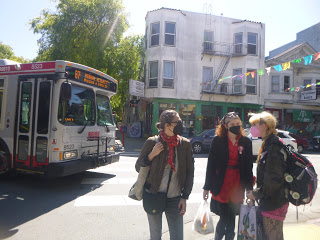


























































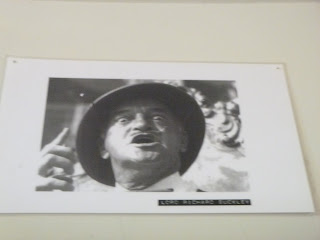















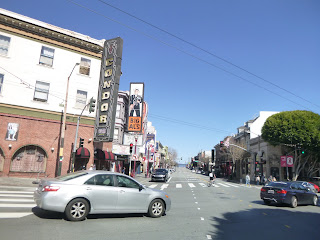









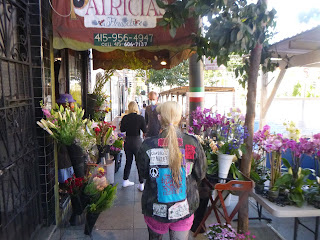






























































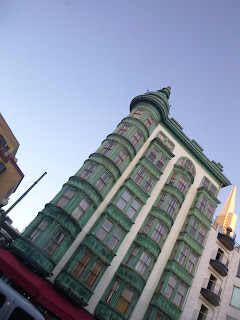



























































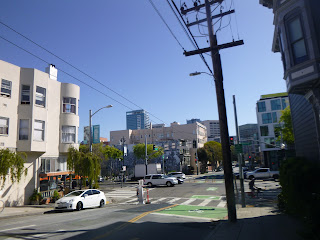















































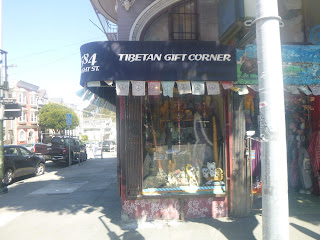



































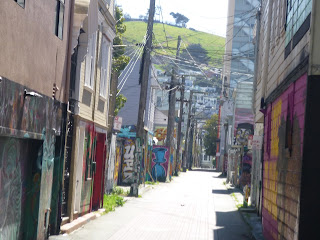













































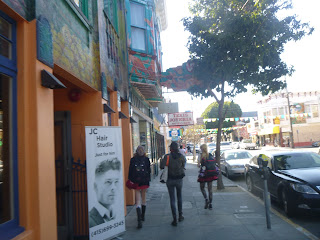




























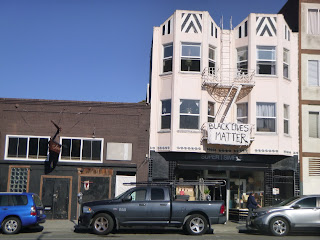
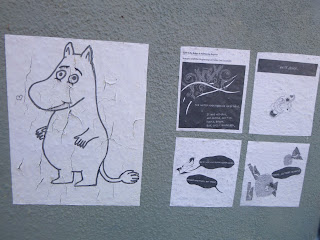







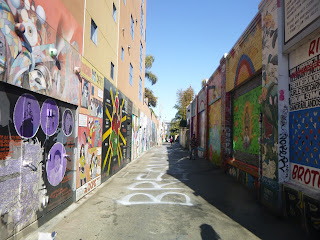





















































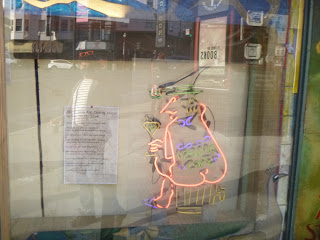



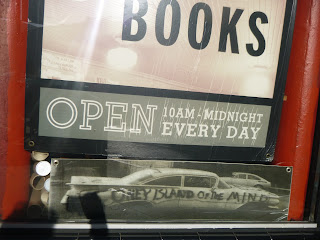










No comments:
Post a Comment